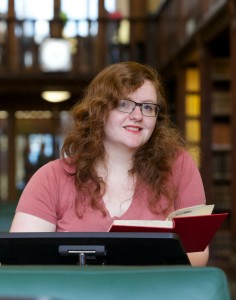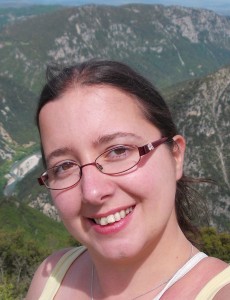 Charly Stamper, an ex-experimental petrologist from the School of Earth Sciences, originally wrote this entry on the Between a Rock and a Hard Place blog. Charly used to make pretend volcanoes; now she works in renewable energy.
Charly Stamper, an ex-experimental petrologist from the School of Earth Sciences, originally wrote this entry on the Between a Rock and a Hard Place blog. Charly used to make pretend volcanoes; now she works in renewable energy.
The nights are getting shorter, the air is getting fresher and here in Bristol it seems like viva season is in full swing. Enough time has elapsed since my own viva that I thought I would share my thoughts about what to expect on the big day.

Whilst everybody’s experience is different, from talking to fellow alumni there do seem to be some common themes:
Your examiners are human. The main thing to remember is that the examiners really just want to have a stimulating and thought-provoking discussion, followed by a trip to the pub. It’s also true to say that never again will somebody be so interested in your thesis (in fact, the examiners will probably the only two people to read the thing cover to cover), so try to make the most of it.
Make chit-chat. The literal translation of a viva voce is “with living voice” – i.e., you’re there to talk! Most vivas begin with an initial 10 – 20 minute chat about the overall project. At this point the examiners will have read your thesis but may not know anything about you or about how you have approached your research, so expect overarching questions and to give a summary of your entire project. Although it’s not easy to think so broadly about work that you’ve lived and breathed every minute of, the few weeks of R&R since hand-in should give you the space you need. Some examples might include:
- What big question were you trying to answer?
- What was your initial hypothesis?
- How did you test this hypothesis?
- Describe your conclusions in a few sentences
- What went wrong?
- What would you do differently if you could start again now?
Know your work. After the initial openings, the examiners will move on to scrutinising your thesis chapter by chapter. If you’re anything like me, you’ll probably find that re-reading your thesis after hand-in will be a fairly torturous experience; however, the number one answer guaranteed to rile your examiners is “I can’t remember”. As well as being well-versed in your own research, make sure you’re familiar with any underlying concepts, equations and principles that you’ve used.
Be prepared to justify your methods. You can rest assured that if your examiners agree with everything you’ve done, they will be playing the part of devil’s advocate in the viva. Alternatively, it’s not uncommon to have contradicted or even explicitly criticised at least one of your examiners’ work in the course of your thesis! Either way, expect some uncomfortably probing questioning on the more controversial parts of your research. You’ll need to demonstrate logic and reasoning behind your decision-making and back that up with evidence.
Be passionate! Even if it’s just for those few hours. It’s fair to say that most people feel a little jaded with at least some aspect of their research by the end of the PhD, but try not to let it show. If you can channel the eager and twinkly-eyed optimism you had at the beginning of the project, then the experience will be more of a two-way discourse than an excruciatingly cringe-worthy inquisition.
Be honest. If something didn’t work during the project (or you’ve since spotted a mistake) then there’s no point trying to skirt around the issue. Explain what you would do now, with the benefit of hindsight, and bear in mind that the examiners may ask you to incorporate some corrections into your final thesis. That’s not to say you should bring these things to your examiners’ attention, but sadly most of them seem to be pretty eagle-eyed!
Enjoy it. Nothing can beat the feeling of relief when you’re done. Just don’t forget to update your social media status – if you’re lost for words then “Dr :)” is a pretty safe bet.

Reposted with permission from Between a Rock and a Hard Place blog.






